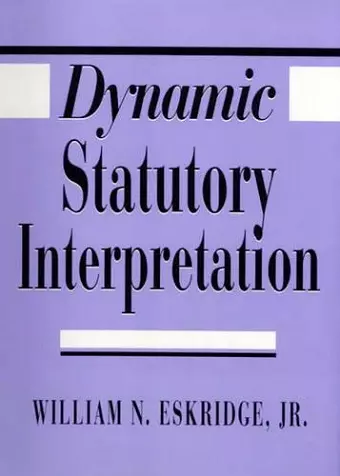Dynamic Statutory Interpretation
Format:Hardback
Publisher:Harvard University Press
Published:15th Jan '95
Currently unavailable, and unfortunately no date known when it will be back

Contrary to traditional theories of statutory interpretation, which ground statutes in the original legislative text or intent, legal scholar William Eskridge argues that statutory interpretation changes in response to new political alignments, new interpreters, and new ideologies. It does so, first of all, because it involves richer authoritative texts than does either common law or constitutional interpretation: statutes are often complex and have a detailed legislative history. Second, Congress can, and often does, rewrite statutes when it disagrees with their interpretations; and agencies and courts attend to current as well as historical congressional preferences when they interpret statutes. Third, since statutory interpretation is as much agency-centered as judge-centered and since agency executives see their creativity as more legitimate than judges see theirs, statutory interpretation in the modern regulatory state is particularly dynamic.
Eskridge also considers how different normative theories of jurisprudence—liberal, legal process, and antiliberal—inform debates about statutory interpretation. He explores what theory of statutory interpretation—if any—is required by the rule of law or by democratic theory. Finally, he provides an analytical and jurisprudential history of important debates on statutory interpretation.
Eskridge’s book is a most distinguished contribution to the literature on the interpretation of statutes; it confirms his leading position in this important area of legal theory. Not since Hart and Sacks’s famous book on the legal process, or Calabresi’s A Common Law for the Age of Statutes, have we had so fruitful and stimulating an exploration of the mysteries of legal interpretation, and Eskridge’s book surpasses those of his distinguished predecessors in theoretical sophistication. -- Richard A. Posner, Chief Judge, U.S. Court of Appeals for the Seventh Circuit
Eskridge puts together a penetrating set of criticisms of liberal and originalist modes of interpretation, and a sustained defense of dynamic interpretation. I found the method of argument very effective: the use of specific critical cases as vehicles for the development of a general argument helps to bring out the practical implications of theoretical argument. Moreover, the grounding of argument in cases is itself exemplary of Eskridge’s anti-foundational orientation to statutory interpretation. Finally, the analysis of specific cases allows the reader to fathom the intense feelings and passions at stake in what might otherwise seem arid doctrinal debates. -- John A. Ferejohn, Stanford University and The Hoover Institution
ISBN: 9780674218789
Dimensions: unknown
Weight: 807g
448 pages